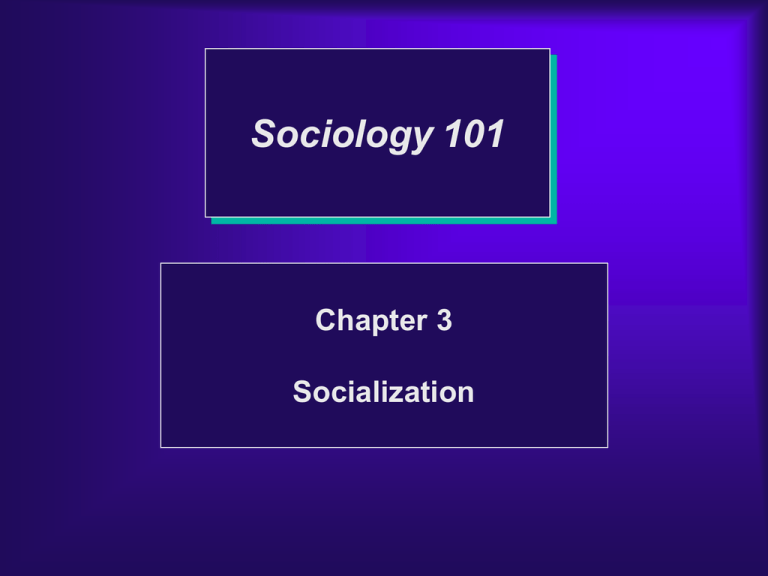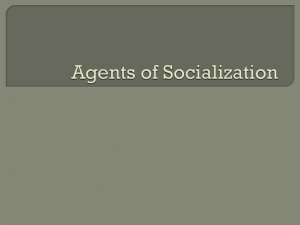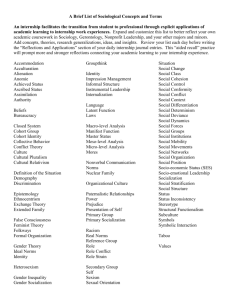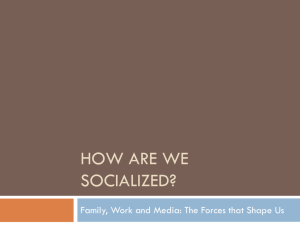Chapter 3: Socialization - Albright College Faculty
advertisement

Sociology 101
Chapter 3
Socialization
Nature or Nurture?
To what extent are people
shaped by biology?
To what extent are people
shaped by society?
There is evidence on both
sides of this debate:
–Twin studies show the
importance of nature
–Isolation studies show the
importance of nurture
• E.g. feral children
–We have to socialize children
to abide by cultural norms
What Is Socialization?
The lifelong process of
social interaction through
which individuals acquire a
self-identity and the physical,
mental and social skills
needed for survival in society
Biophysical Development
We cannot become linguistically
competent if we don’t learn language
from adults by age of 8-9 years old
The process of learning language actually
forms the brain in specific ways
– Feral children remain intellectually
“stunted”
• Anna
• Genie
Normal development of the brain
and personality requires extensive
interaction (socialization) with others
– E.g. the “orphanage” experiment
conducted by Skeels and Dye (1939)
– Orphanages in Romania
Socialization And Cognitive
Development
Research like this caused orphanages
to be closed in the U.S.
It appears that our brains mature by
stages
If we miss a stage, we are unable to
progress further...
The “Self”
We have different feelings,
perceptions and beliefs about
ourselves
The self is people’s perception
of their identity as distinct from
others
– Roles are an important part of the
self
Psychological
Approaches to the Self
Sigmund Freud
– Id, Ego, Superego
Jean Piaget
– A Swiss professor of psychology
– Observed children to see how they
developed
– Suggested that cognitive development
occurred in four stages
Piaget’s Cognitive Stages
Sensorimotor
Stage (0-2)
{Object
Permanence}
Preoperational Stage (2-7)
{Taking the role of
the other}
Concrete Operational Stage (7-11)
{Rule of Conservation}
Formal Operational Stage (12-adolescence)
{Hypothetical Reasoning & Abstraction}
Psychological
Approaches to the Self
Lawrence Kohlberg
– Preconventional Level
– Conventional Level
– Postconventional Level
Carol Gilligan
– Females think differently than males when it comes to moral
reasoning
• Stage 1: A woman is motivated primarily by selfish concerns.
• Stage 2: She recognizes her responsibility to others.
• Stage 3: She makes a decision based on a desire to do the greatest good for
self and for others.
Sociological Approaches
to the Self
Charles Horton Cooley
– Looking Glass Self: We see ourselves as
we think others see us
Sociological Approaches
George Herbert Mead
– Self is divided into “I” and “Me”
– suggests that we develop a “self” in 3 stages
• Pre-play stage: Children imitate what is in their
environment
• Play stage: Children begin playing roles outside
of themselves
• Game stage: Children are able to take the “role
of the other”; thus, they are able to strategize
effectively when playing team sports
Sociological Approaches
Erving Goffman
–
–
You are a collection of social roles (student, sister, athlete, etc.)
We learn how to play our roles because others teach (socialize) us
•
–
–
others taught you how to be “a good student”, sorority member, etc.”
But how do we actually perform these roles?
Goffman argues that we assume roles much like a movie or stage actor
– “All the world is a stage”
• Frontstage
• Backstage
– Impression Management
– Team work
• Helps avoid embarrassing situations and maintains social order…
–
E.g. “The Party”
Harold Garfinkle
– Sharing norms and rules of behavior provide:
• Meaning
• Social stability
– The social order is challenged when these norms are broken
– We see the underlying structure which holds society together when norms are
broken
• “Breaching experiments”
– Breaching Experiments
•
•
•
•
•
•
The professor
Elevator...
Store bartering...
Boarders at home...
Supermarket “borrowing”...
Handing out change…
Each of the above examples suggests:
– That the norms governing and sustaining social
order are taken for granted until challenged
v Deference, politeness, and authority exist because they are
taken for granted
v These beliefs can be successfully challenged by people with
sufficient power or self-assurance
v That challenging the norms governing and sustaining social
order creates chaos, embarrassment, frustration, and a
breakdown in the social order
Agents of Socialization
The persons, groups or institutions that
teach us what we need to know in order to
participate in society
–
–
–
–
The family
The school (Education)
Peer Groups
Mass Media







